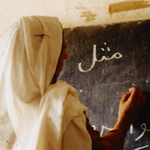Applied Work

Afghanistan Based
Community psychology stresses the need for research to be combined with action. This is particularly important in crisis situations, in which the hope that research findings may one day make a difference in people's lives does nothing to meet immediate needs. Hence my research work in Afghanistan has always included applied, direct service components. These activities have included:
- English language website, statement, and brochure editing to aid Afghan women's organizations in sharing their perspective, concerns and needs with the English speaking world. My approach is to work closely with women themselves, to ensure the preservation of their indigenous voices, words, and expressions with care that their message is conveying in both concrete and subtle ways, the meaning and content that they desire.
- English tutorials and workshops for intermediate and advanced English speakers covering such topics as American versus British English, idioms and slang, and frequent English-Persian usage errors such as "very vs. too."
- Mental health workshops, trainings, and redesign of case assessment documents for Afghan women's social service organizations. These daylong to weeklong trainings introduced culturally appropriate psychology concepts, applications and interventions appropriate for use by lay and psychologically trained Afghan mental health staff. These trainings use concepts from community psychology and clinical psychology, focusing on issues of person and environment, risk and protective factors, culturally relevant coping mechanisms in the face of limited resources and ongoing stress, and the importance of self care and organizational support for care givers.
In the U.S. I work to raise awareness of Afghan women's ongoing struggles and give voice to Afghan women's lives and concerns, through a variety of means including public speaking at the invitation of community organizations, educational settings and media; writing for mainstream print and web-based publications, and incorporating Afghanistan into all of the classes I teach. One particularly notable example is a Spring 2009 collaboration of an upper level Psychology class, the Alex Brown Center for Entrepreneurship at UMBC, with funding from the Kaufmann Center for Entrepreneurship; Mt. De Sales Academy in Catonsville, and the Mir Bacha Kot Girls School in Afghanistan. This project paired UMBC students with a local girls' high school to aid in their innovative partnership to raise money and awareness for a girls' high school in Afghanistan. This course stressed the interconnectivity of cross-cultural communities in a global age, as well as the connectivity between theory and practice, community and the individual, and problem definitions and the design of innovative solutions. By the end of the semester the U.S. based high school and college students raised over $4000 for computers at the Afghan girls' school.
I have also served as a consultant on Afghan cultural to lawyers working with Afghan immigration clients in the U.S. My efforts are to help lawyers and the court better understand the current conditions for women in Afghanistan - and thus the impact and meaning of deportation - as well as the cultural mores, traditions and educational opportunities which may impact the understandings and actions of Afghan refugees in the U.S.